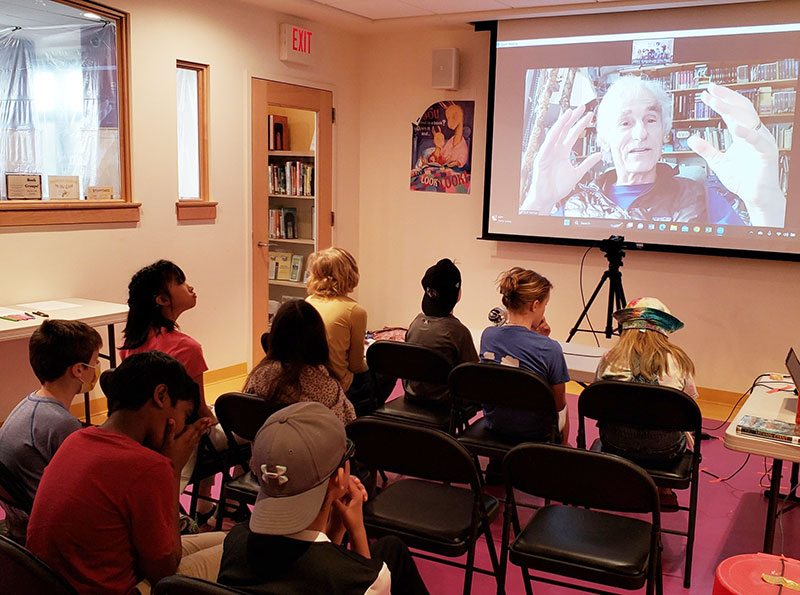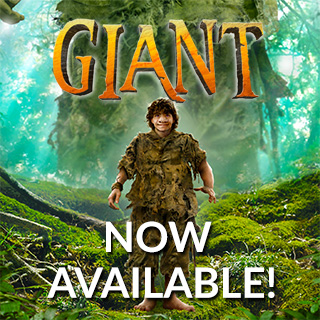T. A. Barron, Award-Winning Author, Shares Ideas With Young Writers
The students have been meeting once a month since the start of school, talking about their reading and ideas about writing and spending 20 minutes either writing from a prompt or continuing on with their own stories. Sharing their work is optional. Kingsbury says they are a great group and do some amazing writing. She is a writer herself, but she says she has been immersed in finishing up her second master’s degree; any dream of writing full time will have to wait.
“When is he coming?” asks one student; “What do we call him?” asks another.
And then, on the screen, is T. A. Barron, an award-winning and New York Times bestselling author, talking from his home in Colorado. “Hello, young writers,” Barron greets the group. Kingsbury tells him the children have been wondering what to call him, and he replies they should call him Tom.

Floor-to-ceiling bookcases
Behind him are what look like floor-to-ceiling bookcases; lots of the books are by him, many translated into different languages. “This is my writing room,” he says. He points to his right and says he probably has more wizard staves than anyone else, gifts from fans of his Merlin series. He says he can see mountains covered in snow from his window but there are also signs of spring, hints of green he calls “leaf breath.” He asks the group if there are signs of spring in Harvard.
Barron lived in Harvard until he was 12 years old. He has written in a published reflection, “Wherever I’ve gone, I’ve carried with me so many memories of my childhood in Harvard.” He returned in 2010, by invitation of Kingsbury, and read from his then latest book in Volunteers Hall. He later tells the group that one of his favorite things was the smell of the apple blossoms in Harvard.
“How many of you have written something?” Barron now asks the group. Lots of hands go up. Barron says that’s great, and Kingsbury tells him they are “awesome writers.” She says the students have questions for him. Before the meeting, the students had helped arrange the room so that they, in turn, could sit in a chair in front of the microphone, introduce themselves, and ask their questions.
No favorite child
Delia, a fourth-grader, goes first, asking, “What is the best book you’ve written?” Barron asks her to clarify that she means his favorite, and then replies that he has written 32 books, and that it would be like asking a dad to choose his favorite child. His books range from children’s picture books to chapter books to 13 books in his Merlin series to his Atlantis trilogy. His latest book, “Giant,” is a prequel to the Merlin books and centers on a very tiny fellow named Shim. “But Shim is a giant in a certain way,” he hints.
Next is Johnny, a sixth-grader, with a question about how the author gets his ideas. Barron replies that his answer may very well surprise Johnny because, although he writes fantasy, he gets his ideas from the real world. There are all kinds of funny, sad, scary things around us that we can feel, and there is unending material. He says the first job of a writer—or anybody, for that matter—is to “be a good noticer.” Observe things closely. Take something small that struck you and add a little drop of imagination; make it as real as possible.
Everyone in the group read at least one book by Barron in preparation for this conversation. Anderson, in grade 4, says he likes to write historical fiction. He tells Barron he liked the phrases in “Tree Girl” and “the suspense you built.” He wonders why, at the end, the girl goes home with her real family and leaves the old man. Barron exclaims—as he had with the previous speakers and continues to do—”That’s such a great question.” He adds, “I love smart readers who ask big questions about life.” He responds that stories are not a one-way street, that they are collaborations between a writer and a reader. “The magic happens when a reader makes the story his own.” He tells Anderson the old man had too much fear about the forest, but that was the girl’s true home; she had to go back.
Seeing the world differently
“I write what I would like to read,” answers Barron in response to fifth-grader Vidhur’s question about choosing a genre. He says that fantasy has the special quality of taking our world and turning it so that a reader can see it differently—like looking in a carnival mirror. Doing that gives the big questions more weight, questions like “What difference can one person make?” and “How are we all connected?” Fantasy makes finding those answers fun and exciting. He says he has also written a nonfiction book about amazing young people, about their courage and perseverance and hope.
Kingsbury introduces Anna, grade 4, telling Barron today is Anna’s birthday, to which Barron responds with good wishes. Her question is, “What motivated you to be a writer?”
Three reasons, says Barron. First, he has loved reading and hearing stories since he was very young, and “If you love something, you keep it in your world.” Second, it’s the best way to travel. You can go anywhere in time or space. Lastly, there’s always more to learn. “I only know a teeny bit about telling stories,” he says, “and writing is a great way to grow.”
Fifth-grader Avery likes fantasy and wants to know if “The Lost Years” is the first in the Merlin series. Barron says it was, but now that he has written “the back story” in his new book, “Giant” is the first. Johan, also a fifth-grader, writes poetry, and wants to know what Barron’s next book will be. With a laugh, Barron replies, “I hope it’s ‘The Making of the Merlin Movie,'” a reference to Disney’s production now in the works. He says the real answer to the question is “top secret.” He asks Johan if he doesn’t agree that poetry is so powerful because there’s so much meaning in a single phrase. Johan nods.
Time’s up
“How do you make characters?” asks Annabelle, who is in grade 4. Barron says he starts with a physical description. Then he goes “inside” to the emotions. He asks his characters what their greatest wish is, their greatest fear. “Then …,” he pauses, addressing the whole group. “I don’t tell this to everyone. Do you want me to tell you?” To a chorus of “Yes!” he says teasingly, “No, you don’t really want to know. Raise your hand if you do.” All hands shoot into the air. He smiles broadly. “OK. I ask them, ‘What is your deepest secret?’ I get amazing answers from my characters.” You need to make characters that are true and authentic, who “walk off the page.”
In answer to fourth-grader Emily’s question about the events in the Atlantis saga, Barron says he took the old myth and imagined what happened before the story it tells. But he had to be consistent with the details of the myth itself. The same is true for the Merlin stories.
Time is up—time that Barron has given generously in response to Kingsbury’s invitation. He smiles broadly at his audience, a smile that goes to his eyes. “Thank you. You have inspired me with your curiosity. Keep reading, imagining, and writing. Have fun telling your own stories.”

